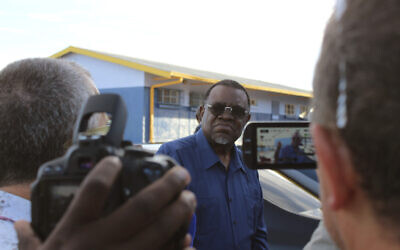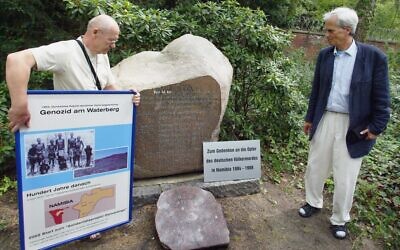- Among other issues, leader says Berlin declined to accept the term ‘reparations,’ as that word was also avoided during country’s negotiations with Israel after the Holocaust
By AFP, August 12, 2020
WINDHOEK, Namibia — Namibia’s President Hage Geingob on Tuesday said reparations offered by Germany for mass killings in its then colony at the start of the twentieth century were “not acceptable” and needed to be “revised.”
German occupiers in Namibia killed tens of thousands of indigenous Herero and Nama people in 1904-1908 massacres, which historians have called the first genocide of the 20th century.
In 2015, the two countries started negotiating an agreement that would combine an official apology by Germany as well as development aid.
Get The Times of Israel’s Daily Edition by email and never miss our top stories Free Sign Up
Geingob on Tuesday was briefed by his government’s special envoy Zed Ngavirue on the status of negotiations.

The briefing took place ahead of a final round of talks for which a date has yet to be set.
“The current offer for reparations made by the German government remains an outstanding issue and is not acceptable to the Namibian government,” Geingob said in a statement after the briefing, adding that Ngavirue had been asked to “continue with negotiations for a revised offer”.
No details were provided on the offer.
The president also noted that Germany had declined to accept the term “reparations,” as that word was also avoided during the country’s negotiations with Israel after the Holocaust.
Ngavirue rejected Germany’s reference to reparations as “healing the wounds” and said the terminology would be subject to further debate, according to the statement.
Berlin was not immediately available for comment on the claims.
Germany has acknowledged that atrocities occurred at the hands of its colonial authorities and some officials have even recognized it as a genocide.
But the country has repeatedly refused to pay direct reparations, citing millions of euros in development aid to the Namibian government.
Namibia was called German South West Africa during Germany’s 1884-1915 rule, and then passed under South African rule for 75 years, finally gaining independence in 1990.
Tensions boiled over in 1904 when the Herero rose up, followed by the Nama, in an insurrection crushed by German imperial troops.
In the Battle of Waterberg in August 1904, around 80,000 Herero fled including women and children.
German troops went after them across what is now known as the Kalahari Desert. Only 15,000 Herero survived.
The German government has so far refused to apologize for the killings.

